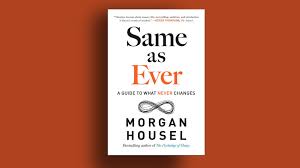Same As Ever | Understanding Timeless Lessons in an Ever-Changing World
We don’t know what’s going to change in the future—when the next recession will hit, what the next big technology will be, or who’s going to win the next election. We’ve never been able to predict these things accurately.
However, the behaviors that have always been enduring and consistent throughout history are what we can rely on. Regardless of what the next technology or the next recession is, we know how people are going to respond.
The Consistency of Human Behavior
The new book “Same as Ever” is a phenomenal read, full of timeless lessons. For anyone who read “The Psychology of Money,” this should come as no surprise.
When we look back at history over centuries, it’s striking how much things change over time. Consider John D. Rockefeller in the early 1900s. People today have a higher standard of living than he did, even though his inflation-adjusted net worth was $400 billion.
In 2023, everyone is talking about AI and technology changing faster than ever. It seems like you have to keep in touch just to keep up.
In writing about things that don’t change, some key overarching themes emerged.
As an amateur student of history, you notice many changes, but what’s always more fascinating is recognizing behaviors from events that took place 50 or 500 years ago.
People reacted exactly the same way they do today. These behaviors haven’t changed at all.
Seeing enough of these across history helps piece together that while we don’t know what’s going to change in the future, we know how people will respond.
The Fragility of Life and the World
One of the first chapters in “Same as Ever,” titled “Hanging by a Thread,” emphasizes how fragile life and our world can be.
Events can compound in unimaginable ways, making it essential to set up our finances and portfolios to be anti-fragile.
Naval Ravikant put it well: if you simulated your life a thousand times, you’d want to become wealthy in 999 of them.
This means constructing a financial situation where you’re in a good position no matter what happens.
Major events like COVID-19, 9/11, World War II, or the Great Depression show that the world would be vastly different if these hadn’t happened. Realizing this fragility makes it clear that setting up our lives and finances to be resilient is critical.
Risk and the Unseen Future
Another key point is that the biggest risks and most important news stories of the next decade will likely be things no one is talking about today.
For example, nobody was discussing the Israel-Hamas conflict in early 2023, but it became a major news story.
The biggest news story of 2024 will be something that’s not on our radar yet.
People often think about risk by creating lists of probabilities for various events.
But if your probabilities add up to 100%, you’re doing it wrong because you’re implicitly assuming you know all possible outcomes. You should always leave room for the unexpected.
The Power of Storytelling in Investing
In investing, the narrative often drives decisions more than data.
The best product Elon Musk has ever created isn’t a Tesla car or SpaceX rocket—it’s Tesla stock.
The story he’s told about the future of Tesla captivates investors more than any spreadsheet ever could.
Similarly, economic behavior reflects stories more than numbers.
This is evident in phenomena like the GameStop saga, where collective belief drove stock prices to unprecedented heights.
Understanding that markets overshoot because people are trying to find the boundaries of belief helps explain why bubbles occur.
For example, in the late 1990s, tech stocks kept rising because investors didn’t know where the top was.
They had to push beyond the boundary to realize they’d gone too far.
A Strategy of Endurance
My own investing strategy focuses on endurance.
I aim to be average for an above-average period of time, investing in Vanguard index funds and hoping to stay the course for the next 50 years.
Historical data shows that even starting at a market peak, long-term investors can achieve excellent returns.
The fragility of businesses and their competitive advantages is another key theme.
For example, Sears had an unbeatable moat in its heyday but eventually failed because it lost its competitive edge.
Successful companies like Sequoia Capital and Nvidia stay dominant by maintaining a constant sense of urgency and fear of going out of business.
The Importance of Inefficiency
Efficiency and perfection are often seen as the ultimate goals, but some of the most successful people, like Einstein and Gates, leave room for inefficiency.
They allocate time for thinking and unstructured activities, which fuels creativity and innovation.
Lastly, the link between happiness and expectations is crucial.
The best way to increase happiness is to lower expectations.
While this is easier said than done, especially when comparing current success to past achievements, it’s a powerful mindset.
Writing for an audience of one—myself—has been a key to my success. It keeps the process enjoyable and authentic, ensuring that what I produce resonates with others who share my interests.
Conclusion
Understanding and embracing the constants in human behavior and market dynamics, preparing for the unexpected, and maintaining a long-term perspective are essential for navigating the ever-changing landscape of investing and life. Thank you for joining me on this exploration of timeless lessons.






